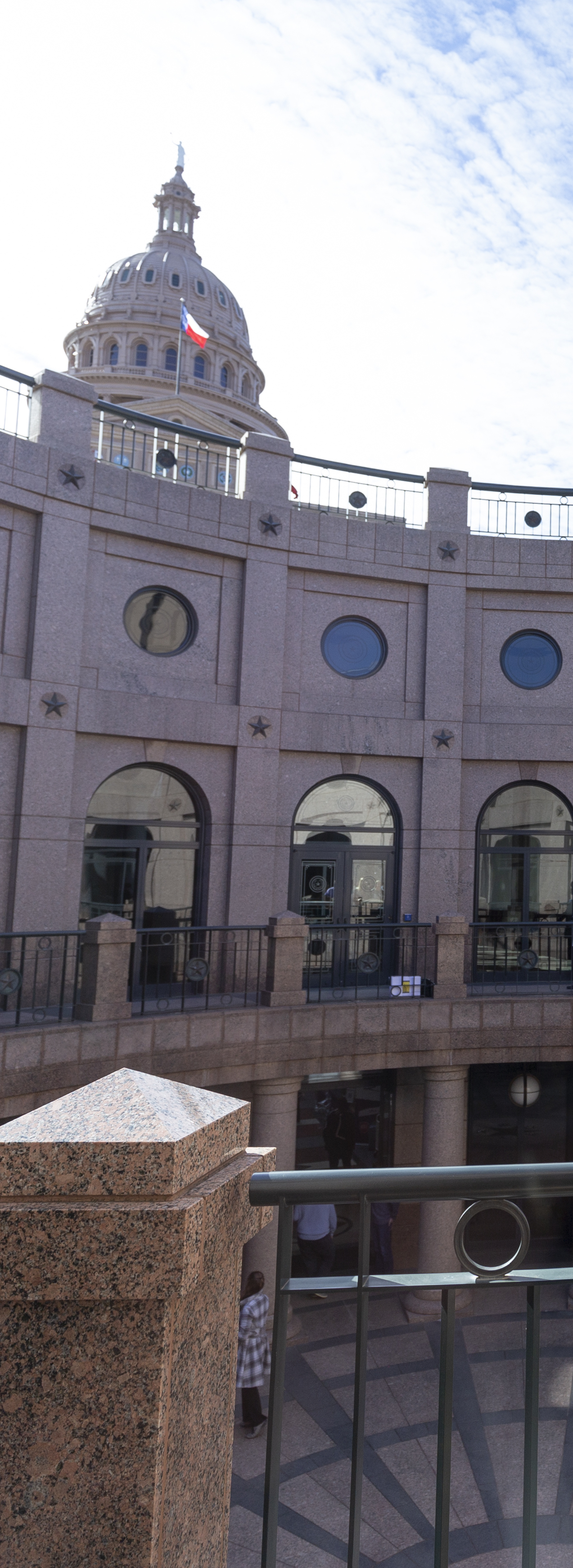 Click here to download the full report pdf.
Click here to download the full report pdf.
The Sierra Club is proud to announce its 2021 Texas Legislative Scorecard.
This year’s scorecard has several new changes, but the objective of this project remains the same: to give Texans a clear picture of the conservation and environmental justice values of elected officials working on their behalf in the Texas Legislature.
There were several priority areas that the 87th Texas Legislature needed to address: pandemic response, fixing the electric grid, Winter Storm Uri recovery, pollution reduction, and so much more, but in short, this was an embarrassing session for lawmakers who care about improving the lives of all Texans. Why? Because not only did the legislature fail to address these needs adequately, it pivoted to attacks on voting rights, LGBTQ Texans, Black Texans, teaching our history of systemic racism, and reproductive health, to name a few. For synopses of how things went, check out the legislative updates on our blog.
Legislation aimed at addressing multiple harms on Black, Indigenous, and people of color communities in Texas was not prioritized. Most bills that touched on these issues did not even get a floor vote and many did not even get a hearing at the committee level.
Sierra Club and our allies fought hard to bring relief to Texans struggling to recover from Winter Storm Uri via the POWER Act (HB 3460), yet this bill did not even get out of committee. We fought hard to pass a bill that would increase our state’s energy efficiency goal (SB 243 and HB 4556), which would have invested millions of dollars into weatherizing homes and small businesses to reduce the risk of future blackouts, lower bills, and create more local green jobs, yet these bills did not get out of committee. Other bills intended to give Texans rate relief or provide tools to manage their energy use through demand response programs did not even get hearings. We fought hard to address methane pollution through larger fines for permit violations, and fought for a statewide no-flaring goal (and a suite of other solutions) yet we couldn’t even get a bill to study methane pollution passed even by a committee in either chamber. Do you see a pattern?
Lawmakers who file good bills too often see those bills die in committee or not even get a hearing because committee chairs control what bills lawmakers are able to vote on, creating a strategic choke point where corporate polluting interests can easily stop bills that would affect their company’s bottom line. There are many other ways good bills are stopped, but it all boils down to legislators that lack the courage to do what is right for their constituents. We need a majority of public servants who will fight for people, and address the racial, social, economic, environmental, and geographic inequities of our state.
Special Session Note: Sierra Club’s analysts formulated this scorecard amid a historic struggle to protect voting rights which unfortunately led to the passage of an anti-voting bill that was signed by the Governor. The 50+ quorum-breaking Democrats who prevented a vote on voter suppression bills in the first special session are admirable and deserve support. Obviously, the decision by some to return resulted in the voting suppression bill moving forward again. However, since votes on voter suppression were already recorded in the regular legislative session, we decided not to include anything from the special sessions in this scorecard.
 The Scorecard
The Scorecard
Most legislative scorecards use floor votes to score lawmakers. However, until there is a majority of legislators that are willing to stand up to special interests in Texas, it will remain a challenge to find meaningful high stakes votes on good bills. All too often, the best bills filed in the Texas Legislature do not come up for a full vote in either the House or Senate; instead, these bills are stopped in committee by hostile lawmakers.
That doesn’t mean there wasn’t enough action to score. To get a clear picture of each legislator’s values, we decided to score not just votes, but also work that lawmakers did (or did not do) on the backend to fight for the success or failure of certain bills. From pushing a committee chair to vote on a good bill to killing a bad bill on a point of order, it is clear that scoring our legislators actions beyond the usual “votes on the floor” can help Texans better understand their legislators’ values and priorities.
In considering what to score, our analysts included:
- Votes on bad bills that would harm Texans.
- Votes on less contested good bills that would help Texans.
- Big omnibus bills that have both good and bad aspects to them. Scoring on votes like those can be tricky because there can be good and bad components to them, so we didn’t include many of them.
- Votes on amendments. Lawmakers sometimes try to revive good bills that died in committee by offering them as amendments to related bills that come up for a vote on the floor. Legislators can attempt to add amendments that would weaken bad bills too.
- And finally, the individual efforts of legislators to pass or prevent bills outside of the vote that they cast on the floor. For example, it meant a lot that Rep. Ron Reynolds worked to get his good bills on low-income weatherization loans and methane pollution (HB 1533, HB 896, HB 897) out of committee, and when the bills died, he tried to get them added as amendments to larger bills. However, since the full House didn’t vote on any of these, we can’t include them in the list of votes. So we adjust individual scores to acknowledge the extra effort.
 What Is Missing?
What Is Missing?
Every time we produce this scorecard, we hear concerns from legislators regarding their scores. While many lawmakers do make some sort of effort to protect our environment (some more, some less), it is clear to both us and their constituents that certain bills in the Texas Legislature matter more.
For legislators that remain unfamiliar with the Sierra Club’s mission and goals, this scorecard can seem a bit arbitrary. Although if you looked at our legislative priorities, or had a conversation with our Conservation Director (Cyrus Reed) in the hallway or in your office, or heard our testimony in countless committee hearings, you would know what our members and supporters care most about.
But why do we decide to base scores on votes like HB 17 (banning local governments from transitioning to building electrification) and not on bills like SB 1772 (pollinator protection)? (For the record, we gave extra credit to its sponsor, Sen. Zaffirini, for getting it passed - though Abbott ultimately vetoed it!) To put it as simply as we can, this scorecard aims to measure how much each lawmaker fought for environmental justice and protection during the 87th Legislature; sometimes, floor votes and bill sponsoring do not tell the whole story. Filing a good bill that has slim chances of passing shouldn’t neutralize a vote for a bad bill that will end up harming people.
In addition, scorecards that include too many “easy” floor votes can marginalize the importance of environmental justice initiatives that never make it off the ground. We’re going beyond the floor vote to bring more attention to those initiatives and actions, because that is the right thing to do.
Is this approach fair? Let’s put it this way. We acknowledge that in the legislative process, compromise and trade-offs are unavoidable. There are so many pressing issues and limited resources to adequately fight for them all; the short, 140-day meeting period that the Texas Legislature is afforded once every two years is just not enough time to get everything done. We’d be foolish not to acknowledge that.
However, when special interests like the Texas Oil and Gas Association or Oncor push back against good environmental justice priorities, your legislator’s values become clearly visible. When faced with the influence of corporate pressure, did your legislator fight for you? Did they throw up their hands and focus on other bills? Was it all just posturing? That’s what we want to find out by doing this scorecard.
 Methodology
Methodology
Because we used different metrics to evaluate lawmaker’s performances during the 87th Legislature, it’s helpful to start with an example to explain our methodology: Comparing the votes on HB 17 and HB 3963.
- HB 17 was a blatant push by the gas industry to ensure that cities and other local governments can’t pass codes, standards, or policies that lead to beneficial electrification of homes and businesses, a key measure to move toward net-zero carbon by moving away from indoor gas use.
- HB 3963, on the other hand, was a good bill. If passed, it would have allowed an agency in control of state property, including a state park, to enter into an agreement with a provider to place and maintain electric vehicle charging equipment on the property. Sierra Club was against HB 17 and for HB 3963.
If, like most scorecards, we weight each of these votes equally, they would both contribute 7 points to a lawmaker’s total score (there were 14 total votes for each lawmaker). But in our scorecard, we have to ask: should the votes on each of these two very different bills really be worth the same amount of points?
While more EV charging stations in state parks (HB 3963) is clearly a good thing, this bill was just not as impactful as HB 17, which unfortunately makes it harder for us to address indoor air quality in millions of Texas homes.
In order to account for the very real difference in impact between these two bills, our scorecard takes a different approach. Instead of asking whether a lawmaker simply voted yes or no on a bill, we also ask:
- How high were the stakes involved?
- How difficult was it to get the votes?
For every vote, we asked our lobby team to answer these two questions on a scale of 1-10. The sum of these two numbers was then converted to a percentage of a total possible score of 147 points in the House, and 138 points in the Senate.
For HB 17, we gave 5 out of 10 points for stakes and 8 out of 10 points for difficulty (the fracked gas industry pushed hard to get the bill through), for a total of 13 out of a possible 20 points. For HB 3963, we gave 2 points for stakes (it would have been much higher if it were a plan to build a statewide network of charging stations) and 2 points for difficulty in getting votes (there weren’t that many special interests opposed to this bill) for a total of 4 out of a possible 20 points. So the vote on HB 17 came to 8.84% (13 of 147) and HB 3963 came to 2.72% (4 of 147).
 Adjustments
Adjustments
Like last session’s scorecard, we made adjustments to raw scores to account for special efforts made by some lawmakers. For example, we gave Rep. Reynolds 3.5 additional points for filing HB 1533 (low-income weatherization loan program) and then getting it added to several other bills as an amendment when the original bill failed to move past Chair Landgraf’s committee.
In addition, this year we decided to make both positive and negative adjustments in this scorecard. In 2019, we only adjusted “up”, meaning that we simply gave lawmakers small acknowledgements of their extra efforts to improve their scores. This year, with so many horrible bills getting passed, we thought it especially important to recognize when our legislators did something bad. Otherwise, we risk painting an incomplete picture of our state’s legislators that may not accurately reflect their values.
We acknowledge that this approach is not perfect. No scorecard is. However, we believe our scorecard accounts for the subjective nature of politicking, which not many of them do.
Acknowledgments
We could not have produced this scorecard without the help of the following individuals: Matt Johnson, Cyrus Reed, Emma Pabst, Eric Krueger, Alex Ortiz, Ken Kramer, Courtney Naquin, Hannah Lopez, Dave Cortez, and Casey Moser. We wouldn’t have anything to report without the passion and commitment of our activists either. Thank you to all the Sierra Club members and supporters who stepped up and called, emailed, wrote, and met with their legislators face to face this year. We appreciate you and your drive to make Texas a better place to live.
Finally, Sierra Club is a part of a larger movement to make Texas a more equitable, inclusive, democratic, and anti-racist place. We still have a long way to go, but to that end, we want to acknowledge that this scorecard is missing several votes that would give an even clearer and representative view of each lawmaker’s values. There were terrible bills filed attacking trans Texans and reproductive healthcare for example, as well as bills intended to stifle education about our country’s legacy of racism, and many others. Since we did not have enough capacity to support our allies who fought against these bills (and tried to push good bills), and since we did not take an official position on many of them (via direct lobbying), we felt it would not be proper to include them here. We did, however, include the major bills aimed at stifling voting rights (SB 7) and undermining worker rights (SB 14) since we were more directly involved in fighting those particular pieces of legislation.
However, we want to work more closely with allied organizations in the future to collaborate on how to fill out the picture of each elected official through a more comprehensive equity and social justice lens.
For a more complete picture of how our lawmakers scores stack up on other issues such as LGBTQ rights, criminal justice, reproductive healthcare, and more, check out the accountability work of Texas Freedom Network, Equality Texas, AVOW, Planned Parenthood Texas Votes, SEIU, ACLU of Texas, Progress Texas, and Mi Familia Vota.
Photos courtesy of Al Braden